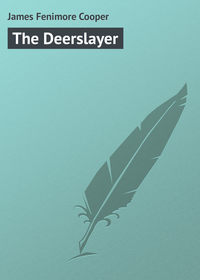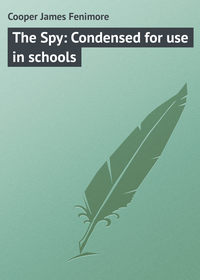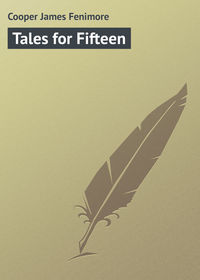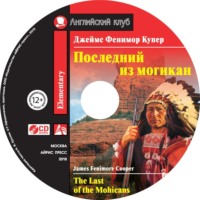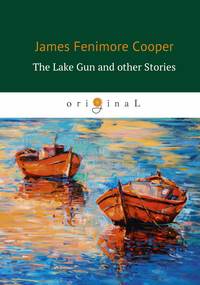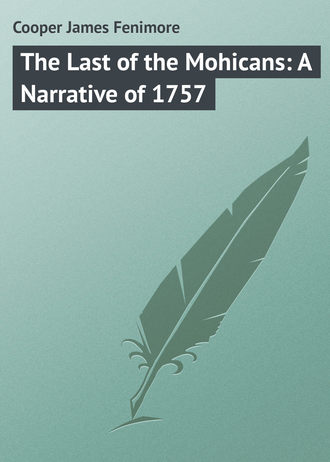 полная версия
полная версияThe Last of the Mohicans: A Narrative of 1757
Large piles of brush lay scattered about the clearing, and a wary and aged squaw was occupied in firing as many as might serve to light the coming exhibition. As the flame arose, its power exceeded that of the parting day, and assisted to render objects at the same time more distinct and more hideous. The whole scene formed a striking picture, whose frame was composed of the dark and tall border of pines. The warriors just arrived were the most distant figures. A little in advance stood two men, who were apparently selected from the rest, as the principal actors in what was to follow. The light was not strong enough to render their features distinct, though it was quite evident that they were governed by very different emotions. While one stood erect and firm, prepared to meet his fate like a hero, the other bowed his head, as if palsied by terror or stricken with shame. The high-spirited Duncan felt a powerful impulse of admiration and pity towards the former, though no opportunity could offer to exhibit his generous emotions. He watched his slightest movement, however, with eager eyes; and as he traced the fine outline of his admirably proportioned and active frame, he endeavored to persuade himself, that if the powers of man, seconded by such noble resolution, could bear one harmless through so severe a trial, the youthful captive before him might hope for success in the hazardous race he was about to run. Insensibly the young man drew nigher to the swarthy lines of the Hurons, and scarcely breathed, so intense became his interest in the spectacle. Just then the signal yell was given, and the momentary quiet which had preceded it was broken by a burst of cries, that far exceeded any before heard. The most abject of the two victims continued motionless; but the other bounded from the place at the cry, with the activity and swiftness of a deer. Instead of rushing through the hostile lines, as had been expected, he just entered the dangerous defile, and before time was given for a single blow, turned short, and leaping the heads of a row of children, he gained at once the exterior and safer side of the formidable array. The artifice was answered by a hundred voices raised in imprecations; and the whole of the excited multitude broke from their order, and spread themselves about the place in wild confusion.
A dozen blazing piles now shed their lurid brightness on the place, which resembled some unhallowed and supernatural arena, in which malicious demons had assembled to act their bloody and lawless rites. The forms in the background looked like unearthly beings, gliding before the eye, and cleaving the air with frantic and unmeaning gestures; while the savage passions of such as passed the flames, were rendered fearfully distinct by the gleams that shot athwart their inflamed visages.
It will easily be understood, that amid such a concourse of vindictive enemies, no breathing time was allowed the fugitive. There was a single moment when it seemed as if he would have reached the forest, but the whole body of his captors threw themselves before him, and drove him back into the centre of his relentless persecutors. Turning like a headed deer, he shot, with the swiftness of an arrow, through a pillar of forked flame, and passing the whole multitude harmless, he appeared on the opposite side of the clearing. Here too he was met and turned by a few of the older and more subtle of the Hurons. Once more he tried the throng, as if seeking safety in its blindness, and then several moments succeeded, during which Duncan believed the active and courageous young stranger was lost.
Nothing could be distinguished but a dark mass of human forms tossed and involved in inexplicable confusion. Arms, gleaming knives, and formidable clubs, appeared above them, but the blows were evidently given at random. The awful effect was heightened by the piercing shrieks of the women and the fierce yells of the warriors. Now and then Duncan caught a glimpse of a light form cleaving the air in some desperate bound, and he rather hoped than believed that the captive yet retained the command of his astonishing powers of activity. Suddenly the multitude rolled backward, and approached the spot where he himself stood. The heavy body in the rear pressed upon the women and children in front, and bore them to the earth. The stranger reappeared in the confusion. Human power could not, however, much longer endure so severe a trial. Of this the captive seemed conscious. Profiting by the momentary opening, he darted from among the warriors, and made a desperate, and, what seemed to Duncan, a final effort to gain the wood. As if aware that no danger was to be apprehended from the young soldier, the fugitive nearly brushed his person in his flight. A tall and powerful Huron, who had husbanded his forces, pressed close upon his heels, and with an uplifted arm menaced a fatal blow. Duncan thrust forth a foot, and the shock precipitated the eager savage headlong, many feet in advance of his intended victim. Thought itself is not quicker than was the motion with which the latter profited by the advantage; he turned, gleamed like a meteor again before the eyes of Duncan, and at the next moment, when the latter recovered his recollection, and gazed around in quest of the captive, he saw him quietly leaning against a small painted post, which stood before the door of the principal lodge.
Apprehensive that the part he had taken in the escape might prove fatal to himself, Duncan left the place without delay. He followed the crowd, which drew nigh the lodges, gloomy and sullen, like any other multitude that had been disappointed in an execution. Curiosity, or perhaps a better feeling, induced him to approach the stranger. He found him, standing with one arm cast about the protecting post, and breathing thick and hard, after his exertions, but disdaining to permit a single sign of suffering to escape. His person was now protected by immemorial and sacred usage, until the tribe in council had deliberated and determined on his fate. It was not difficult, however, to foretell the result, if any presage could be drawn from the feelings of those who crowded the place.
There was no term of abuse known to the Huron vocabulary that the disappointed women did not lavishly expend on the successful stranger. They flouted at his efforts, and told him, with bitter scoffs, that his feet were better than his hands; and that he merited wings, while he knew not the use of an arrow or a knife. To all this the captive made no reply; but was content to preserve an attitude in which dignity was singularly blended with disdain. Exasperated as much by his composure as by his good-fortune, their words became unintelligible, and were succeeded by shrill, piercing yells. Just then the crafty squaw, who had taken the necessary precaution to fire the piles, made her way through the throng, and cleared a place for herself in front of the captive. The squalid and withered person of this hag might well have obtained for her the character of possessing more than human cunning. Throwing back her light vestment, she stretched forth her long skinny arm, in derision, and using the language of the Lenape, as more intelligible to the subject of her gibes, she commenced aloud —
"Look you, Delaware!" she said, snapping her fingers in his face; "your nation is a race of women, and the hoe is better fitted to your hands than the gun. Your squaws are the mothers of deer; but if a bear, or a wild cat, or a serpent were born among you, ye would flee. The Huron girls shall make you petticoats, and we will find you a husband."
A burst of savage laughter succeeded this attack, during which the soft and musical merriment of the younger females strangely chimed with the cracked voice of their older and more malignant companion. But the stranger was superior to all their efforts. His head was immovable; nor did he betray the slightest consciousness that any were present, except when his haughty eye rolled towards the dusky forms of the warriors, who stalked in the background, silent and sullen observers of the scene.
Infuriated at the self-command of the captive, the woman placed her arms akimbo; and throwing herself into a posture of defiance, she broke out anew, in a torrent of words that no art of ours could commit successfully to paper. Her breath was, however, expended in vain; for, although distinguished in her own nation as a proficient in the art of abuse, she was permitted to work herself into such a fury as actually to foam at the mouth, without causing a muscle to vibrate in the motionless figure of the stranger. The effect of his indifference began to extend itself to the other spectators; and a youngster, who was just quitting the condition of a boy, to enter the state of manhood, attempted to assist the termagant, by flourishing his tomahawk before their victim, and adding his empty boasts to the taunts of the woman. Then, indeed, the captive turned his face towards the light, and looked down on the stripling with an expression that was superior to contempt. At the next moment he resumed his quiet and reclining attitude against the post. But the change of posture had permitted Duncan to exchange glances with the firm and piercing eyes of Uncas.
Breathless with amazement, and heavily oppressed with the critical situation of his friend, Heyward recoiled before the look, trembling lest its meaning might, in some unknown manner, hasten the prisoner's fate. There was not, however, any instant cause for such an apprehension. Just then a warrior forced his way into the exasperated crowd. Motioning the women and children aside with a stern gesture, he took Uncas by the arm, and led him towards the door of the council lodge. Thither all the chiefs, and most of the distinguished warriors, followed; among whom the anxious Heyward found means to enter without attracting any dangerous attention to himself.
A few minutes were consumed in disposing of those present in a manner suitable to their rank and influence in the tribe. An order very similar to that adopted in the preceding interview was observed; the aged and superior chiefs occupying the area of the spacious apartment, within the powerful light of a glaring torch, while their juniors and inferiors were arranged in the background, presenting a dark outline of swarthy and marked visages. In the very centre of the lodge, immediately under an opening that admitted the twinkling light of one or two stars, stood Uncas, calm, elevated, and collected. His high and haughty carriage was not lost on his captors, who often bent their looks on his person, with eyes which, while they lost none of their inflexibility of purpose, plainly betrayed their admiration of the stranger's daring.
The case was different with the individual whom Duncan had observed to stand forth with his friend, previously to the desperate trial of speed; and who, instead of joining in the chase, had remained, throughout its turbulent uproar, like a cringing statue, expressive of shame and disgrace. Though not a hand had been extended to greet him, nor yet an eye had condescended to watch his movements, he had also entered the lodge, as though impelled by a fate to whose decrees he submitted, seemingly, without a struggle. Heyward profited by the first opportunity to gaze in his face, secretly apprehensive he might find the features of another acquaintance; but they proved to be those of a stranger, and, what was still more inexplicable, of one who bore all the distinctive marks of a Huron warrior. Instead of mingling with his tribe, however, he sat apart, a solitary being in a multitude, his form shrinking into a crouching and abject attitude, as if anxious to fill as little space as possible. When each individual had taken his proper station, and silence reigned in the place, the gray-haired chief already introduced to the reader, spoke aloud, in the language of the Lenni Lenape.
"Delaware," he said, "though one of a nation of women, you have proved yourself a man. I would give you food; but he who eats with a Huron should become his friend. Rest in peace till the morning sun, when our last words shall be spoken."
"Seven nights, and as many summer days, have I fasted on the trail of the Hurons," Uncas coldly replied; "the children of the Lenape know how to travel the path of the just without lingering to eat."
"Two of my young men are in pursuit of your companion," resumed the other, without appearing to regard the boast of his captive; "when they get back, then will our wise men say to you 'live' or 'die.'"
"Has a Huron no ears?" scornfully exclaimed Uncas; "twice, since he has been your prisoner, has the Delaware heard a gun that he knows. Your young men will never come back!"
A short and sullen pause succeeded this bold assertion. Duncan, who understood the Mohican to allude to the fatal rifle of the scout, bent forward in earnest observation of the effect it might produce on the conquerors; but the chief was content with simply retorting, —
"If the Lenape are so skilful, why is one of their bravest warriors here?"
"He followed in the steps of a flying coward, and fell into a snare. The cunning beaver may be caught."
As Uncas thus replied, he pointed with his finger toward the solitary Huron, but without deigning to bestow any other notice on so unworthy an object. The words of the answer and the air of the speaker produced a strong sensation among his auditors. Every eye rolled sullenly towards the individual indicated by the simple gesture, and a low, threatening murmur passed through the crowd. The ominous sounds reached the outer door, and the women and children pressing into the throng, no gap had been left, between shoulder and shoulder, that was not now filled with the dark lineaments of some eager and curious human countenance.
In the meantime, the more aged chiefs, in the centre, communed with each other in short and broken sentences. Not a word was uttered that did not convey the meaning of the speaker, in the simplest and most energetic form. Again, a long and deeply solemn pause took place. It was known, by all present, to be the grave precursor of a weighty and important judgment. They who composed the outer circle of faces were on tiptoe to gaze; and even the culprit for an instant forgot his shame in a deeper emotion, and exposed his abject features, in order to cast an anxious and troubled glance at the dark assemblage of chiefs. The silence was finally broken by the aged warrior so often named. He arose from the earth, and moving past the immovable form of Uncas, placed himself in a dignified attitude before the offender. At that moment, the withered squaw already mentioned moved into the circle, in a slow, sideling sort of a dance, holding the torch, and muttering the indistinct words of what might have been a species of incantation. Though her presence was altogether an intrusion, it was unheeded.
Approaching Uncas, she held the blazing brand in such a manner as to cast its red glare on his person, and to expose the slightest emotion of his countenance. The Mohican maintained his firm and haughty attitude; and his eye, so far from deigning to meet her inquisitive look, dwelt steadily on the distance, as though it penetrated the obstacles which impeded the view, and looked into futurity. Satisfied with her examination, she left him, with a slight expression of pleasure, and proceeded to practise the same trying experiment on her delinquent countryman.
The young Huron was in his war paint, and very little of a finely moulded form was concealed by his attire. The light rendered every limb and joint discernible, and Duncan turned away in horror when he saw they were writhing in irrepressible agony. The woman was commencing a low and plaintive howl at the sad and shameful spectacle, when the chief put forth his hand and gently pushed her aside.
"Reed-that-bends," he said, addressing the young culprit by name, and in his proper language, "though the Great Spirit has made you pleasant to the eyes, it would have been better that you had not been born. Your tongue is loud in the village, but in battle it is still. None of my young men strike the tomahawk deeper into the war-post – none of them so lightly on the Yengeese. The enemy know the shape of your back, but they have never seen the color of your eyes. Three times have they called on you to come, and as often did you forget to answer. Your name will never be mentioned again in your tribe – it is already forgotten."
As the chief slowly uttered these words, pausing impressively between each sentence, the culprit raised his face, in deference to the other's rank and years. Shame, horror, and pride struggled in its lineaments. His eye, which was contracted with inward anguish, gleamed on the persons of those whose breath was his fame; and the latter emotion for an instant predominated. He arose to his feet, and baring his bosom, looked steadily on the keen, glittering knife, that was already upheld by his inexorable judge. As the weapon passed slowly into his heart he even smiled, as if in joy at having found death less dreadful than he had anticipated, and fell heavily on his face, at the feet of the rigid and unyielding form of Uncas.
The squaw gave a loud and plaintive yell, dashed the torch to the earth, and buried everything in darkness. The whole shuddering group of spectators glided from the lodge, like troubled sprites; and Duncan thought that he and the yet throbbing body of the victim of an Indian judgment had now become its only tenants.
CHAPTER XXIV
"Thus spoke the sage: the kings without delayDissolve the council, and their chief obey."Pope's Iliad.A single moment served to convince the youth that he was mistaken. A hand was laid, with a powerful pressure, on his arm, and the low voice of Uncas muttered in his ears, —
"The Hurons are dogs. The sight of a coward's blood can never make a warrior tremble. The 'Gray Head' and the Sagamore are safe, and the rifle of Hawkeye is not asleep. Go, – Uncas and the 'Open Hand' are now strangers. It is enough."
Heyward would gladly have heard more, but a gentle push from his friend urged him towards the door, and admonished him of the danger that might attend the discovery of their intercourse. Slowly and reluctantly yielding to the necessity, he quitted the place, and mingled with the throng that hovered nigh. The dying fires in the clearing cast a dim and uncertain light on the dusky figures that were silently stalking to and fro; and occasionally a brighter gleam than common glanced into the lodge, and exhibited the figure of Uncas still maintaining its upright attitude near the dead body of the Huron.
A knot of warriors soon entered the place again, and reissuing, they bore the senseless remains into the adjacent woods. After this termination of the scene, Duncan wandered among the lodges, unquestioned and unnoticed, endeavoring to find some trace of her in whose behalf he incurred the risk he ran. In the present temper of the tribe, it would have been easy to have fled and rejoined his companions, had such a wish crossed his mind. But, in addition to the never-ceasing anxiety on account of Alice, a fresher, though feebler interest in the fate of Uncas assisted to chain him to the spot. He continued, therefore, to stray from hut to hut, looking into each only to encounter additional disappointment, until he had made the entire circuit of the village. Abandoning a species of inquiry that proved so fruitless, he retraced his steps to the council lodge, resolved to seek and question David, in order to put an end to his doubts.
On reaching the building which had proved alike the seat of judgment and the place of execution, the young man found that the excitement had already subsided. The warriors had reassembled, and were now calmly smoking, while they conversed gravely on the chief incidents of their recent expedition to the head of the Horican. Though the return of Duncan was likely to remind them of his character, and the suspicious circumstances of his visit, it produced no visible sensation. So far, the terrible scene that had just occurred proved favorable to his views, and he required no other prompter than his own feelings to convince him of the expediency of profiting by so unexpected an advantage.
Without seeming to hesitate, he walked into the lodge, and took his seat with a gravity that accorded admirably with the deportment of his hosts. A hasty but searching glance sufficed to tell him that, though Uncas still remained where he had left him, David had not reappeared. No other restraint was imposed on the former than the watchful looks of a young Huron, who had placed himself at hand; though an armed warrior leaned against the post that formed one side of the narrow door-way. In every other respect, the captive seemed at liberty; still he was excluded from all participation in the discourse, and possessed much more of the air of some finely moulded statue than a man having life and volition.
Heyward had too recently witnessed a frightful instance of the prompt punishments of the people into whose hands he had fallen, to hazard an exposure by any officious boldness. He would greatly have preferred silence and meditation to speech, when a discovery of his real condition might prove so instantly fatal. Unfortunately for this prudent resolution, his entertainers appeared otherwise disposed. He had not long occupied the seat wisely taken a little in the shade, when another of the elder warriors, who spoke the French language, addressed him: —
"My Canada father does not forget his children," said the chief; "I thank him. An evil spirit lives in the wife of one of my young men. Can the cunning stranger frighten him away?"
Heyward possessed some knowledge of the mummery practised among the Indians, in the cases of such supposed visitations. He saw, at a glance, that the circumstance might possibly be improved to further his own end. It would, therefore, have been difficult, just then, to have uttered a proposal that would have given him more satisfaction. Aware of the necessity of preserving the dignity of his imaginary character, however, he repressed his feelings, and answered with suitable mystery, —
"Spirits differ; some yield to the power of wisdom, while others are too strong."
"My brother is a great medicine," said the cunning savage; "he will try?"
A gesture of assent was the answer. The Huron was content with the assurance, and resuming his pipe, he awaited the proper moment to move. The impatient Heyward, inwardly execrating the cold customs of the savages, which required such sacrifices to appearance, was fain to assume an air of indifference, equal to that maintained by the chief, who was, in truth, a near relative of the afflicted woman. The minutes lingered, and the delay had seemed an hour to the adventurer in empiricism, when the Huron laid aside his pipe, and drew his robe across his breast, as if about to lead the way to the lodge of the invalid. Just then, a warrior of powerful frame darkened the door, and stalking silently among the attentive group, he seated himself on one end of the low pile of brush which sustained Duncan. The latter cast an impatient look at his neighbor, and felt his flesh creep with uncontrollable horror when he found himself in actual contact with Magua.
The sudden return of this artful and dreaded chief caused a delay in the departure of the Huron. Several pipes, that had been extinguished, were lighted again; while the newcomer, without speaking a word, drew his tomahawk from his girdle, and filling the bowl on its head, began to inhale the vapors of the weed through the hollow handle, with as much indifference as if he had not been absent two weary days on a long and toilsome hunt. Ten minutes, which appeared so many ages to Duncan, might have passed in this manner; and the warriors were fairly enveloped in a cloud of white smoke before any of them spoke.
"Welcome!" one at length uttered; "has my friend found the moose?"
"The young men stagger under their burdens," returned Magua. "Let 'Reed-that-bends' go on the hunting-path; he will meet them."
A deep and awful silence succeeded the utterance of the forbidden name. Each pipe dropped from the lips of its owner as though all had inhaled an impurity at the same instant. The smoke wreathed above their heads in little eddies, and curling in a spiral form, it ascended swiftly through the opening in the roof of the lodge, leaving the place beneath clear of its fumes, and each dark visage distinctly visible. The looks of most of the warriors were riveted on the earth; though a few of the younger and less gifted of the party suffered their wild and glaring eyeballs to roll in the direction of a white-headed savage, who sat between two of the most venerated chiefs of the tribe. There was nothing in the air or attire of this Indian that would seem to entitle him to such a distinction. The former was rather depressed, than remarkable for the bearing of the natives; and the latter was such as was commonly worn by the ordinary men of the nation. Like most around him, for more than a minute his look too was on the ground; but, trusting his eyes at length to steal a glance aside, he perceived that he was becoming an object of general attention. Then he arose and lifted his voice in the general silence.


